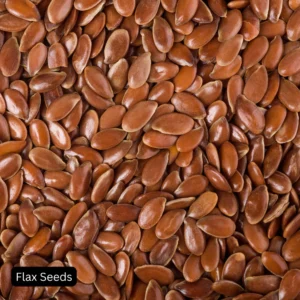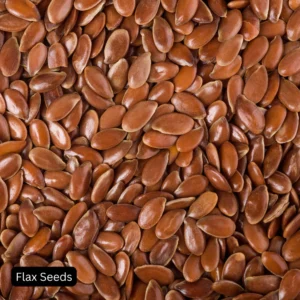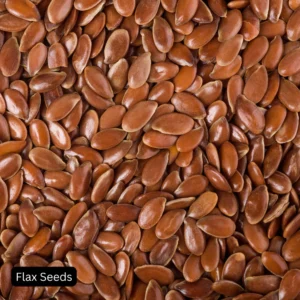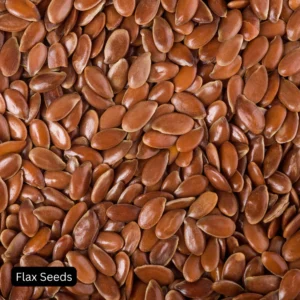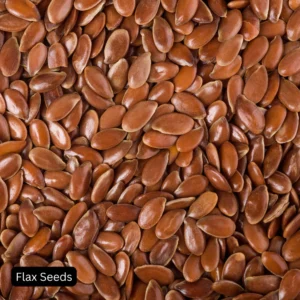Flax Seeds
Showing all 5 results
Showing all 5 results
The Marvels of Flax Seeds: A Nutritional Powerhouse
Discover the health benefits and versatile uses of flax seeds, the tiny nutritional gems.
Flax seeds, also known as linseeds, have been celebrated for their remarkable health benefits and versatile uses for centuries. These tiny seeds are packed with essential nutrients and offer a wide range of advantages when incorporated into a balanced diet. In this article, we will delve into the wonders of flax seeds, their origin, nutritional value, and practical ways to include them in your daily routine. Prepare to unlock the potential of these marvelous seeds and boost your overall well-being.
Table of Contents
- Introduction
- Origins and History
- Nutritional Value of Flax Seeds
- Health Benefits of Flax Seeds
- Incorporating Flax Seeds into Your Diet
- Flax Seed Recipes and Culinary Inspiration
- Frequently Asked Questions
- Conclusion
Introduction
Flax seeds are derived from the flax plant, scientifically known as Linum usitatissimum, and have been used for their health benefits since ancient times. These seeds have gained popularity in the modern era due to their impressive nutritional profile and potential impact on overall well-being.
Flax seeds have a mild, nutty flavor that makes them an excellent addition to various dishes. They can be easily incorporated into your meals, offering a delightful texture and a nutritional boost.
Origins and History
Flax seeds have a rich history that dates back thousands of years. They were cultivated in ancient civilizations such as Egypt and China, where they were highly regarded for their medicinal properties and culinary uses. The use of flax seeds for both nutritional and industrial purposes has continued throughout history.
In ancient Egypt, flax seeds were an integral part of the diet and were also used in the production of linen fabric. The health benefits of flax seeds were recognized in traditional Chinese medicine, where they were used to support digestion and promote overall wellness.
Nutritional Value of Flax Seeds
Flax seeds are a nutritional powerhouse, packed with essential nutrients. Here are some key nutritional highlights:
1. Omega-3 Fatty Acids
Flax seeds are an excellent plant-based source of omega-3 fatty acids, specifically alpha-linolenic acid (ALA). Omega-3 fatty acids are crucial for heart health, brain function, and reducing inflammation in the body.
2. Fiber
Flax seeds are an exceptional source of dietary fiber. They contain both soluble and insoluble fiber, promoting digestive health, regulating blood sugar levels, and supporting weight management.
3. Protein
Flax seeds are a good plant-based source of protein. They provide essential amino acids necessary for various bodily functions, including muscle repair and growth.
4. Antioxidants
Flax seeds are rich in antioxidants, such as lignans, which help protect the body against oxidative stress and contribute to overall health.
Health Benefits of Flax Seeds
Flax seeds offer a plethora of health benefits when incorporated into a balanced diet. Here are some notable advantages:
1. Heart Health
The omega-3 fatty acids in flax seeds have been linked to a reduced risk of heart disease by supporting healthy cholesterol levels, reducing blood pressure, and promoting proper heart function.
2. Digestive Health
The high fiber content of flax seeds supports digestive health by promoting regular bowel movements, preventing constipation, and supporting the growth of beneficial gut bacteria.
3. Hormonal Balance
Flax seeds contain lignans, which have estrogenic properties and may help balance hormone levels in the body. This can be particularly beneficial for women experiencing menopause or hormonal imbalances.
4. Skin Health
The omega-3 fatty acids and antioxidants in flax seeds contribute to healthy skin by reducing inflammation, promoting moisture retention, and protecting against skin damage caused by free radicals.
Incorporating Flax Seeds into Your Diet
Adding flax seeds to your daily diet is simple and can be done in various ways. Here are some easy ways to incorporate them:
1. Ground Flax Seeds
Flax seeds have a hard outer shell that can be challenging to digest. Grinding them into a fine powder using a coffee grinder or blender allows for better nutrient absorption. Add ground flax seeds to smoothies, cereals, yogurt, or baked goods.
2. Flaxseed Oil
Flaxseed oil is a concentrated source of omega-3 fatty acids. Use it as a dressing for salads, drizzle it over cooked vegetables, or add it to homemade sauces and marinades.
3. Flaxseed Meal
Flaxseed meal is ground flax seeds with a coarser texture than the finely ground powder. It can be used as a binder in recipes such as veggie burgers or as an egg substitute in baking.
Flax Seed Recipes and Culinary Inspiration
Here are a few recipe ideas to inspire you to incorporate flax seeds into your culinary creations:
1. Flaxseed Crackers
Combine flaxseed meal with your choice of herbs and spices, water, and a binding agent such as chia seeds or psyllium husk. Roll out the dough, cut it into crackers, and bake until crispy for a delicious and nutritious snack.
2. Flaxseed Smoothie
Add a tablespoon of ground flax seeds to your favorite smoothie recipe for an extra dose of fiber and omega-3 fatty acids. Blend it with fruits, leafy greens, and your choice of liquid for a refreshing and nutritious beverage.
3. Flaxseed Yogurt Parfait
Create a nutritious and satisfying parfait by layering Greek yogurt, fresh berries, and a sprinkle of ground flax seeds.
Frequently Asked Questions
1. Are flax seeds suitable for individuals with gluten intolerance?
Yes, flax seeds are naturally gluten-free and can be safely consumed by individuals with gluten intolerance or celiac disease.
2. Can flax seeds be eaten whole?
While flax seeds can be eaten whole, it is recommended to grind them before consumption to enhance nutrient absorption and digestibility.
3. How should flax seeds be stored?
Whole flax seeds can be stored in an airtight container in a cool, dark place for up to a year. Ground flax seeds should be stored in the refrigerator to maintain freshness and prevent oxidation.
Conclusion
Flax seeds are a nutritional powerhouse packed with essential nutrients, including omega-3 fatty acids, fiber, protein, and antioxidants. Their numerous health benefits, such as supporting heart health, promoting digestive well-being, and providing hormonal balance, make them a valuable addition to any diet. With their versatility and mild nutty flavor, flax seeds can be easily incorporated into various dishes and recipes, boosting both nutrition and taste. Embrace the marvels of flax seeds and embark on a journey towards improved health and vitality.


